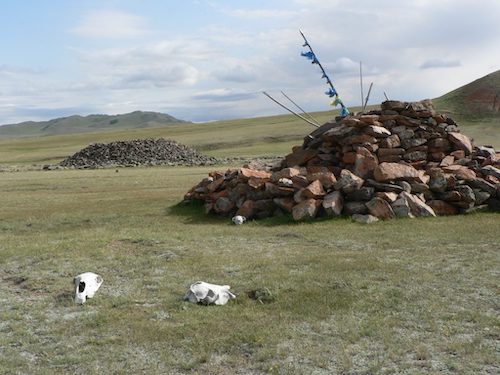Potter College News
Anthropologist Awarded Grant for Mongolia Research
- Tuesday, February 13th, 2024

Associate professor Jean-Luc Houle, an anthropological archaeologist in the Department of Folk Studies and Anthropology, was awarded a grant from the Rust Family Foundation to support his ongoing research in Mongolia. He will study climate change, ritual, and the emergence of social complexity among mobile pastoralists on the steppe several thousand years ago. A leading expert on Mongolian archaeology, Dr. Houle has worked in several parts of the country for over two decades, focusing on the sheep, goat, cattle, and horse herding communities that pre-date the Mongol Empire.
Dr. Houle is studying the environmental context for the sudden increase in social complexity – as evidenced by construction of large-scale ritualistic monuments like burial mounds (pictured here) – among equestrian pastoralists in northwestern Mongolia in the Late Bronze Age (circa 1200 BC). Did herding communities develop larger and more complex social organizations in response to environmental deterioration and drought, or did warmer/wetter conditions favor these cultural changes?
The Rust Family Foundation grant will support fieldwork and lab analyses to test Dr. Houle’s hypothesis that the increase in the scale of communal rituals coincided with changes in environmental conditions. By analyzing soils and plant and animal remains, he and his collaborators will reconstruct paleoenvironmental and grassland conditions during the emergence of equestrian pastoralism and the development of early complex societies over a 4,000-year period. Through radiocarbon dating, the team will determine the chronological sequence of monument construction to investigate changes in ritual behavior over time. Analysis of animal bones will track diachronic changes in livestock populations.
Dr. Houle’s climate-focused research is highly relevant today. Global warming trends this century are projected to be more severe in Inner Asia, resulting in widespread drought, pasture degradation, and reduced water supplies. The average temperature increase in the northern Mongolian steppe already is more than twice the average global change. In 2023 almost four million heads of livestock died due to extreme weather events, affecting the livelihoods of 200,000 households in a country where nearly half of the population depends on livestock production, a way of life that goes back millennia. Archaeology provides a unique, long-term perspective on how nomadic societies respond to changing climatic conditions. If nomadic societies first developed and flourished during a long dry spell, contemporary climate trends might not seem such a serious threat to herding communities. However, if they developed and spread under a wetter climate, what does this mean for the future of contemporary nomads facing desertification?
Active participation by WKU students is another compelling feature of Dr. Houle’s research. Since 2012, 26 Hilltoppers have participated in his summer archaeology field school with several going multiple years, like four of the eight students who will travel this May-June. In-field they work with other students from around the world. WKU students mentored by Dr. Houle have received grants from the Fulbright Program, the American Center for Mongolian Studies, and other sources to conduct fieldwork and lab analyses. One anthropology major’s Honors thesis examined traditional fuel use on the Mongolian steppe. WKU students are co-authors on three journal articles and four national/international conference presentations on topics such as horse domestication and dispersals on the steppe.
Another exciting aspect of Dr. Houle’s research is the international collaborations involved. He works with faculty and staff of the National Museum of Mongolia, the University of Edinburgh in the UK, the University of Oulu in Finland, and the Spanish National Research Council and the University of La Laguna in Spain. The multidisciplinary expertise of geoarchaeologists, archaeobotanists, zooarchaeologists, and other experts enables the international team to investigate the complex nature of human decision making and adaptation in the past.
Learn more about Dr. Houle's research at https://westernmongoliaarchaeology.weebly.com/.
The Rust Family Foundation was established in 1998 in honor of Margaret Dole Rust (1918-1995) to support art and archaeology museums, libraries, and historic preservation, as well as other initiatives such as animal welfare and veterans’ assistance. Since the archaeology research funding program began in 2015, the Foundation has supported about 200 projects around the globe. This is Dr. Houle’s second grant from the Foundation to support his research in Mongolia.
Some of the links on this page may require additional software to view.

